Hog workers bring home antibiotic-resistant bacteria
Workers exposed to antibiotic-resistant bacteria in an industrial hog operation in North Carolina were found to carry it with them for up to two weeks, according to a recent study in the journal Occupational and Environmental Medicine. Livestock operations frequently add antibiotics to animal feed and water as a means of increasing growth and preventing disease as opposed to treating infections. It is well known that this practice leads to the development of antibiotic-resistant bacteria, and studies have shown that these resistant bacteria can also be transferred to humans working with livestock. This study is the first to show that once workers in the hog industry are exposed to antibiotic-resistant bacteria in livestock, they continue to carry it away from the production sites, potentially exposing the general public to the pathogen.




